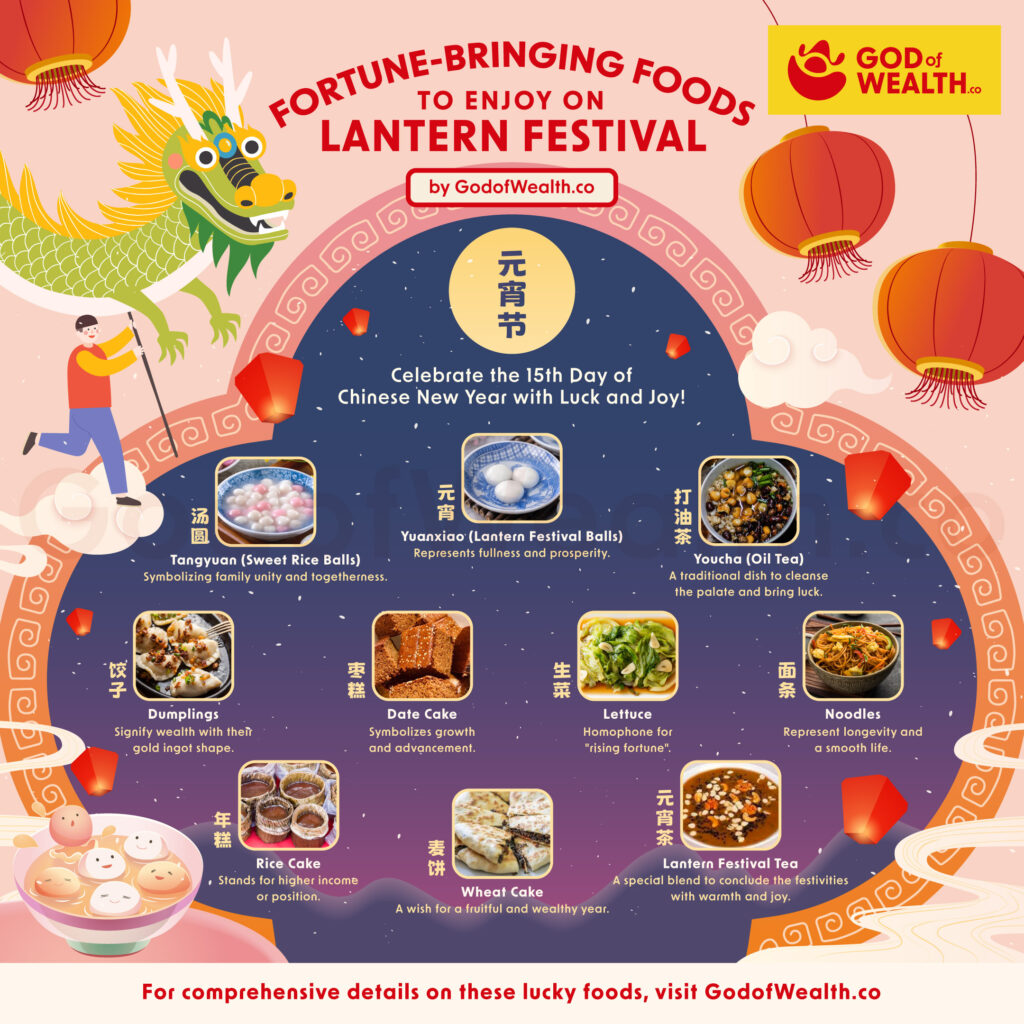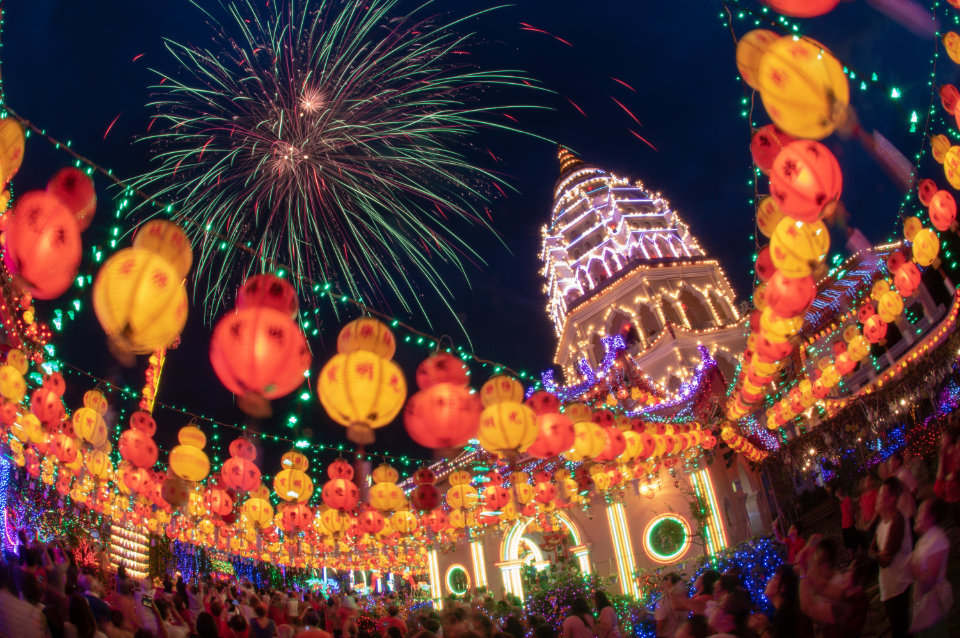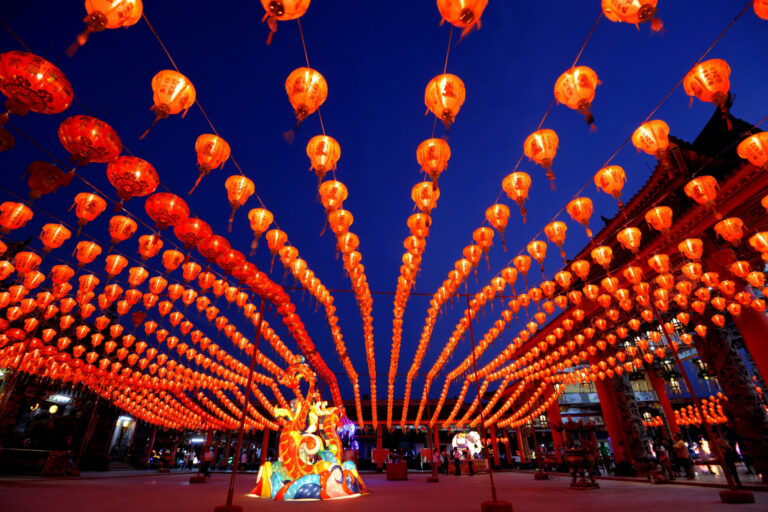During the annual Lantern Festival, which marks the end of the Lunar New Year celebrations, people exchange Lantern Festival wishes and gather to pray for good fortune and wealth. Also known as the, Yuanxiao jie (元宵节) / Shangyuan Festival (上元节), it is considered an auspicious time to seek blessings for the coming year.
On the 15th day of the first lunar month, Taoist temples conduct activities aimed at transforming luck, enhancing fortune, and boosting wealth.
Beyond spiritual practices, dietary choices are believed to play a crucial role in improving one’s luck and prosperity for the year ahead. Below are 10 foods traditionally consumed during the Lantern Festival to help boost your luck:
Table of Contents
10 Best Lucky Foods to Eat on Lantern Festival

1. Tangyuan (Sweet Rice Balls) 汤圆
On the day of the Lantern Festival, families in the south eat Tangyuan, also known as “soup balls” or “yuanzi” “tuanzi.” Dating back to the Northern Song dynasty, Tangyuan is primarily made from glutinous rice with a variety of fillings, mostly sweet, sticky, and round.
The name Tangyuan is phonetically close to “reunion,” symbolizing family unity, so eating Tangyuan during the Lantern Festival embodies the beauty of family togetherness.
2. Yuanxiao (Lantern Festival Balls) 元宵
“Making noise for Yuanxiao on the fifteenth of the first month,” Yuanxiao is an essential food in the north for the Lantern Festival, with its round and smooth appearance symbolizing family unity and happiness.
Although Yuanxiao looks similar to Tangyuan, it is made by chopping the filling into pieces, dipping them in water, and then rolling them in a container filled with glutinous rice flour until they form round balls with a dry and fluffy outer layer, offering a chewy texture when eaten.
3. Youcha (Oil Tea) 打油茶
Eating oil tea during the Lantern Festival is popular among the Dong and Yao ethnic groups in Guangxi, Guizhou, and Hunan. It is not the “tea” that we brew but a “flour tea” that is pre-fried. The fried oil tea powder is cooked into a paste, hot and fragrant, with ground sesame, peanuts, etc., added, symbolizing the coming year’s harvest and satisfaction.
4. Dumplings 饺子
People in the north have a tradition of eating dumplings during festivals, and as the first traditional festival after the Spring Festival, dumplings are an indispensable delicacy of the Lantern Festival.
In Henan, there’s a custom called “flat on the fifteenth, round on the sixteenth” for the Lantern Festival. Dumplings, resembling ancient Chinese money (sycee), and with their careful selection of fillings, are not only a form of emotional sustenance but also symbolize wealth and treasure.
5. Date Cake 枣糕
People in the western part of Henan like to eat date cake for the Lantern Festival, which is considered auspicious and promising. Eating date cake on the Lantern Festival signifies a prosperous and sweet future.
The cake is made from flour, date paste, and brown sugar, originally a palace dessert during the Qing dynasty, with a history of over 200 years.
6. Lettuce 生菜
In addition to eating sweet rice dumplings during the Lantern Festival, Cantonese people also enjoy crispy and delicious lettuce, symbolizing a wish for a good omen during the festival. The word for lettuce (“生菜”) is a homophone for “making money” (“生财”), implying wealth and good fortune.
Affordable and versatile, whether served cold in a salad or stir-fried, lettuce is an indispensable food on the Lantern Festival table.
7. Noodles 面条
The tradition of eating noodles during the Lantern Festival is popular in areas north of the Yangtze River. There’s an old saying, “Eat lanterns on Lantern Festival, noodles on the day the lanterns are taken down, looking forward to the next year.”
People in the northern regions have a special affection for noodles, with a wide variety to choose from, including beef noodles, intestine noodles, and kidney flower noodles, all famous dishes. You can pick according to your preference, eating noodles when the lanterns are taken down symbolizes continuous joy.
8. Rice Cake 年糕
Some northern areas have the tradition of eating rice cake during the Lantern Festival. Known as “年糕” or sticky cake, distinct from the southern glutinous rice cake, it’s made primarily from millet and red dates, fragrant and sticky.
It can be sliced and then steamed, fried, or pan-fried, offering a coarse texture and a “robust” taste.
9. Wheat Cake 麦饼
Eating wheat cake on the fifteenth day of the first lunar month is a unique custom in Pujiang. The wheat cakes are large, round, and chewy, with both sweet and savory fillings.
Sweet versions contain sugar and sesame, while savory ones are filled with dried shrimp, green onions, diced meat, and dried tofu. Crispy and golden on both sides, they symbolize “prosperity and reunion for generations.”
10. Lantern Festival Tea 元宵茶
In Shaanxi and other places, drinking Lantern Festival tea is a custom. This traditional food is not ordinary tea but a soup made with various fruits, vegetables, lean meat, shrimp, fresh fish, and spices like pepper and fennel, cooked together to create a porridge-like dish.

Other Lantern Festival Celebrations
- Lantern Displays and Parades: Cities and towns across the region light up with elaborate lantern displays and parades. These can range from hand-held paper lanterns to large-scale illuminated sculptures, often depicting scenes from folklore or zodiac animals.
- Riddle-Solving Games: Lanterns are not only for display but also serve as a medium for traditional games. Riddles are often written on lanterns, and participants try to solve them, which is believed to bring good luck and stimulate intellect.
- Dragon and Lion Dances: These energetic and colorful performances are a staple at Lantern Festival celebrations, symbolizing power, wisdom, and good fortune. The dances are performed by troupes that mimic the movements of the mythical creatures to the sound of drums and cymbals.
- Fireworks and Firecrackers: Similar to the Lunar New Year celebrations, fireworks and firecrackers are set off during the Lantern Festival to ward off evil spirits and bring about good luck and prosperity.
- Praying for a Good Match: The Lantern Festival serves as an opportune moment for eligible bachelors and bachelorettes to seek a favorable match.
- Visiting Yue Lao Temples: Specifically, visiting temples dedicated to Yue Lao, the god of marriage and love, is recommended.
- Requesting the Red String of Fate and Lucky Coins: While at the temple, it’s customary to ask for the red string of fate and carry lucky coins, which are believed to attract a desirable partner in the new year.
- Walking on Stilts: In some regions, performers on stilts participate in parades and performances, wearing colorful costumes and masks. This tradition adds a playful and spectacular element to the celebrations.
- Floating Lanterns: In certain areas, people celebrate by setting lanterns afloat on rivers or lakes. These floating lanterns are thought to carry away troubles and bring hope and peace for the future.
- Family Reunions: While not a public spectacle, the Lantern Festival is also a time for family gatherings, where loved ones who may have been apart during the Lunar New Year have another opportunity to celebrate together, reinforcing family bonds.
- Praying for Prosperity and Health: Apart from prayers for a good match, individuals and families also visit temples to pray for prosperity, health, and success in the coming year, offering incense and participating in temple rituals.
Lantern Festival Taboos
The day of the Lantern Festival also signifies the end of the Spring Festival celebrations. Chinese customs include many taboos during the New Year, and the Lantern Festival is no exception, with its own set of prohibitions, which are just as numerous as those at the beginning of the year.
Whether or not adhering to these will affect your luck throughout the year is up to personal belief.
- Do not knock on the bowl while eating sweet rice dumplings, as in ancient times, only beggars would knock on bowls.
- It is also believed that Han Dan (寒單爺), the god of wealth associated with martial valor, is averse to the cold. Therefore, consuming frozen food or anything excessively cold could potentially repel wealth.
- The rice container at home should never be empty, as in ancient times, this was a bad omen indicating a lack of food, which could negatively impact financial fortune.
- It’s advisable not to kill living things since the Lantern Festival is the birthday of the Fortune Star, “The Heavenly Official,” and it’s believed that the Fortune Star descends to the mortal world disapproving of killing.
- Avoid lending money to others, as it could lend out your good fortune as well.
- Homes should be brightly lit; if too dim, it symbolizes a bleak future, hence the ancient practice of lighting lanterns during the Lantern Festival.
- Avoid washing or cutting hair; as “hair” is a homophone for “prosperity” in Chinese, cutting or washing it could signify the loss of wealth.
- Wearing white or black clothing is also not suitable, as the Lantern Festival is a day of celebration, and black and white are traditionally worn during mourning.
- Do not wear torn or damaged clothes, as it could signify financial loss.
- Do not tease birds, as there’s a folk tale that the Lantern Festival originated from a hunter who mistakenly shot a divine bird of the Jade Emperor, who, in anger, threatened to set fire to the human world. Thus, fireworks and lanterns are lit during the Lantern Festival as a symbol that humanity has received its punishment, so it’s especially advised not to tease birds.
- Since the Lantern Festival is the birthday of the Heavenly Official, families, friends, and children should avoid quarrels to not provoke the deities.
- Moving house on this day could move away the good fortune.
- Knocking on the house could knock away the fortune and wealth.
- The Lantern Festival is the anniversary of the Lady of the Waters, a folk heroine who fought against demons and lost a lot of blood entering the water; hence, it’s advised to avoid going to the beach or using sharp objects to avoid seeing blood.
- Children should not place lanterns in front of mirrors to avoid attracting negative energies, as mirrors are considered to belong to the yin realm and placing them in front of mirrors symbolizes guiding the spirits of the underworld.
Lantern Festival Traditions and Customs
During the Lantern Festival, various shaped lanterns are commonly seen. The tradition of hanging lanterns originated from a legend about an ancient divine bird that was accidentally killed by a hunter after it got lost and descended to the mortal world.
The Heavenly Emperor, enraged upon learning about this, ordered heavenly soldiers to set fire to the human realm on the 15th day of the first lunar month. A kind-hearted celestial daughter, worried about the innocent people, risked informing humans about the impending doom.
Alarmed by the news, the people, on the advice of a wise elder, hung red lanterns and set off firecrackers and fireworks on the 15th day of the first month. The spectacle of red light led the celestial soldiers to believe that the mortal world was already ablaze, sparing the people from the fire and saving their lives. Since then, every year on the 15th day of the first month, people celebrate by carrying lanterns and setting off fireworks.
On Lantern Festival, every household worships and consumes “Yuanxiao” (sweet rice balls), which is different from Tangyuan in that the filling is not directly wrapped in the dough. Instead, Yuanxiao is made by shaking the fillings in a bamboo sieve to coat them with sticky rice flour.
The round shape and the homophony of Yuanxiao symbolize reunion and completeness under the full moon on the 15th day of the first month, expressing happiness and remembrance of departed relatives.
Sky Lanterns in Pingxi
Releasing sky lanterns in Pingxi is a major event of the Lantern Festival each year. Also known as Kongming lanterns, one origin of sky lanterns is attributed to Zhuge Kongming (諸葛孔明), who used them for military communication.
The tradition of releasing sky lanterns in Pingxi also arose from the past when bandits roamed the mountains, and villagers would release sky lanterns to signal to those hiding that it was safe to return home.
This happened to coincide with the Lantern Festival, thus starting the custom of releasing sky lanterns carrying wishes and prayers for blessings as an important local culture.
Beehive Fireworks in Tainan, Taiwan
Beehive Fireworks in Tainan The famous Beehive Fireworks of Yanshui in Tainan originated from a local outbreak of plague.
As the number of patients and deaths increased, the people invited the palanquin of Guan Sheng Di Jun (關聖帝君) to patrol the streets from the 13th to the 15th day of the first month, setting off firecrackers along the alleys to drive away the plague spirits, which led to the subsidence of the plague.
The practice of setting off firecrackers during Guan Sheng Di Jun’s patrol on the Lantern Festival has continued to this day.
Bombarding Master Han Dan (炸寒單爺) in Taitung, Taiwan
The “Bombarding Master Han Dan” ritual in Taitung involves throwing firecrackers at a palanquin carrying Master Han Dan, who is considered the God of Wealth. Legend has it that he is extremely afraid of the cold, so people throw firecrackers at his palanquin to warm him up and dispel the cold.
During the ritual, a person represents Master Han Dan by standing half-naked, welcoming the baptism of firecrackers. It is a common belief that “the more vigorously the firecrackers explode, the more prosperous the wealth will be.”
Celebrating Unity and Prosperity: The Lantern Festival
As the Lantern Festival illuminates the night sky, it brings with it the promise of prosperity, unity, and love. This celebration not only marks the culmination of the Lunar New Year festivities but also symbolizes the communal hope for a brighter future.
Each tradition of the Lantern Festival, from the radiant glow of lanterns to the savory sweetness of tangyuan, is infused with profound cultural meaning and naturally embodies Lantern Festival wishes for prosperity and happiness.
How will you embrace the traditions of the Lantern Festival to light up your life in the coming year?
What is the Lantern Festival?
The Lantern Festival, celebrated on the 15th day of the first lunar month, marks the end of Chinese New Year celebrations. It’s a time for families to reunite, enjoy lantern displays, solve lantern riddles, and eat sweet rice balls (tangyuan), symbolizing togetherness and happiness.
When is the Lantern Festival celebrated?
The Lantern Festival is celebrated annually on the 15th day of the first lunar month in the lunar calendar, which typically falls in February or early March in the Gregorian calendar.
What are the traditional foods of the Lantern Festival?
The most traditional food is tangyuan, sweet glutinous rice balls filled with sesame, peanut, or red bean paste, symbolizing family unity and completeness.
Why do people light lanterns during the Lantern Festival?
Lighting lanterns is a tradition symbolizing the release of past selves and the embrace of new, brighter futures. Lanterns are also believed to ward off evil spirits, bringing luck and light to families.
Is the Lantern Festival celebrated outside of China?
Yes, the Lantern Festival is celebrated in many countries with significant Chinese populations, including Taiwan, Singapore, Malaysia, and the Philippines, each adding their local customs and traditions to the celebration.
Can international visitors participate in Lantern Festival celebrations?
Absolutely! International visitors are welcome and encouraged to participate in the festival activities. It’s a fantastic opportunity to experience Chinese culture, enjoy traditional foods, and partake in the festive atmosphere.



